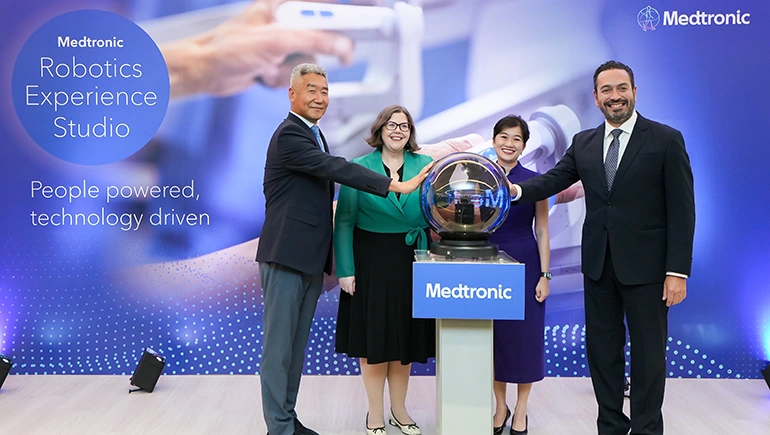Medtronic plc (NYSE:MDT), a global leader in healthcare technology, expands the capabilities of Medtronic Customer eXperience Center (MCXC) in Singapore with the opening of its first Robotics Experience Studio in Southeast Asia. This underscores the commitment of Medtronic to enhance access to new technologies through collaboration, training and education within the healthcare ecosystem. The opening ceremony was held today in the presence of Jacqueline Poh, Managing Director of Singapore Economic Development Board, Sarah McGrath, Ambassador, Embassy of Ireland in Singapore, Majid Kaddoumi, Senior Vice President, Medtronic EurAsia and leading healthcare professionals from America, Korea, Singapore and India.
Since the opening of MCXC in November 2022, Medtronic has made substantial strides in medical education and upskilling, having trained more than 2,000 healthcare professionals (HCPs) across Asia and conducted nearly 1,400 training and experience sessions. The addition of the Robotics Experience Studio is set to amplify these efforts by providing cutting-edge resources for HCPs to hone their skills in robotic-assisted procedures and artificial intelligence (AI) applications.
The launch event brought together leading medical experts from around the world and featured a panel discussion on the topic of the future of Robotics and AI in healthcare. Titled “The future of Robotics and AI in the healthcare landscape – a Global and Asian perspective”, the dialogue highlighted how Robotics and AI technologies are transforming healthcare, and the unique challenges and opportunities present in Asia’s diverse healthcare landscape, where rapid population growth and increasing life expectancy are driving demand for more personalized and sophisticated treatments. The discussion also included the readiness of current healthcare organizations, professionals, and systems to adopt Robotics and AI technologies, and the anticipated efforts to facilitate this adoption.
The advancement of medical technology in Robotics and AI have demonstrated significant improvements in patient outcomes which include reduced complications, faster recovery times and improved precision in surgical interventions. However, despite significant economic growth in some parts of Asia, the provision of equitable and accessible healthcare is still an ongoing challenge in the region.



